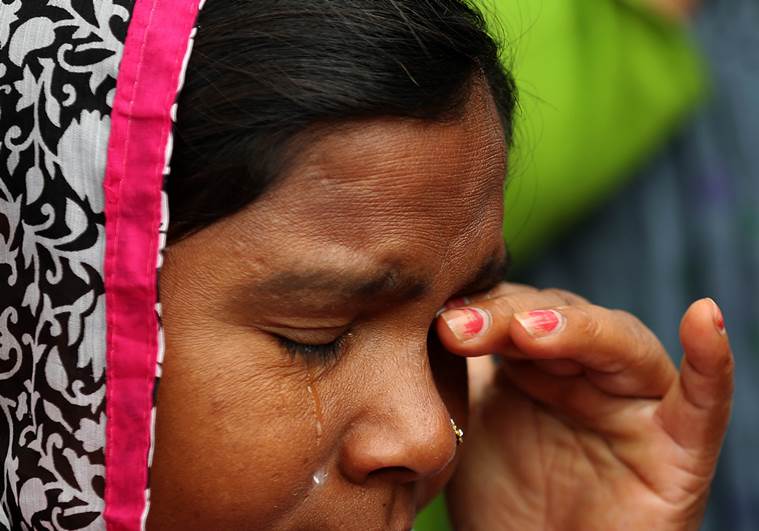 At the ‘stop killing us’ protest organised by the Safai Karmachari Andolan. (Express photo by Tashi Tobgyal)
At the ‘stop killing us’ protest organised by the Safai Karmachari Andolan. (Express photo by Tashi Tobgyal)
Sarfaraz’s father, Anil’s partner and Tinku’s wife — strangers with little in common except tales of tragedy — gathered at Jantar Mantar Tuesday morning to protest against sewer deaths and manual scavenging. At the ‘stop killing us’ protest organised by the Safai Karmachari Andolan, names of the men, who died cleaning sewers and sewage treatment plants (STP), reverberated through the air.
Rani (30) and her two children came from Delhi’s Dabri Extension, while Mamta (28) took a train from Ludhiana, and in each other they found solace. As Rani wept on stage looking at Anil’s photo — who died on September 14 while cleaning a sewer in Dabri Extension — Mamta said, “I understand what she’s going through. I lost my husband in 2012… he was cleaning an STP in Ludhiana and died after inhaling poisonous gases. Nothing has changed in the last six years.”
At the four-hour-long protest, slogans such as ‘Jai Bhim’ and ‘Inquilab Zindabad’ were raised, while posters read ‘Mangalyaan goes to the sky, people in sewers forced to die’. As activists and student leaders spoke about the dead, 33-year-old Virender, a manual scavenger, wondered about the living. “I have trouble breathing, I injure myself often, my body has been aching for years… I have been doing this job for 18 years but have never once been given a mask or a safety belt. We are left to die,” he said.
From Khamanon in Punjab came 45-year-old Sukhjeet with the same concerns: “I have been doing this job for 12 years, and earn Rs 6,000 a month… even after all these deaths, we are not provided gloves, masks or safety belts. My brother lost one eye when he entered a sewer and was injured by a wire. Does this happen anywhere else in the world?”
Eleven days after Anil died, a grieving Rani at the protest site said, “No one should die like this… all I want now is to educate my three children, so they don’t end up doing the same work Anil did.”
In attendance were politicians Brinda Karat, Subhashini Ali and D Raja, activists Kavita Krishnan and Nikhil Dey, writer Arundhati Roy and student leaders Umar Khalid and N Sai Balaji. “You have heard about Rafale, Bullet trains… but have you heard of a machine that can clean sewers?” asked Dey, while Khalid termed the deaths “murders”. National convener of the Safai Karmachari Andolan, Bezwada Wilson, called sewers’ “death chambers”, as protesters set fire to three black cardboard sewage models with “death” written on them in bold.
Seated next to a ‘Jai Bhim’ poster was Kamleshwar (55), a ragpicker from Ludhiana, with his 17-year-old son Armaan’s last photograph. “He was forced to go into the STP of a hotel in Ludhiana where he used to work, on December 11 last year… he died after inhaling gases. You’ve heard this before, haven’t you? We got no compensation, no justice… you’ve heard this before, too, haven’t you?” he asked.